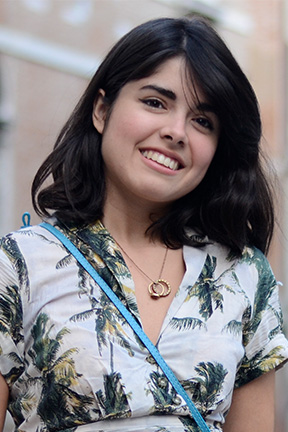Candidate Statement: Nicole Cabrera Salazar
Nominated Office: Nominating Committee
Affiliation: Movement Consulting
Position/title: CEO
PhD institution: Georgia State University (2017)
Areas of scientific interest:
- Physics Education Research
- Equity and Inclusion Research
AAS positions & dates:
- Co-Chair, Committee on the Status of Minorities in Astronomy (2018 – Present)
- Co-Chair, Site Visit Oversight Committee (2017 – Present)
- Member, Committee on the Status of Minorities in Astronomy (2016 – Present)
Other relevant positions and experience:
- Founder and CEO, Movement Consulting (2017 – Present)
Founded a company to help science institutions make their cultures more inclusive. Services consist of faculty training, student workshops, tailored programming, and STEM inclusion consulting. Clients include Harvard University, Stanford University, University of Arizona, University of Colorado Boulder, Haverford College, and University of California, Santa Cruz.
- Social Impact Team Lead + Research Scientist, Future Laboratories, 2017
Conducted research on the viability of a US universal basic income (UBI) for a social innovation company. Designed, facilitated, and coordinated logistics for team on-boarding. Studied the historical context, status quo, and potential impact of UBI on marginalized Americans. Collaborated with team members to design a simple, plausible, and affordable American UBI program. Co-authored a rigorous Pew-style report on research findings with recommendations for implementing UBI in the US.
- Properties, Activity, + Planet-Hosting Potential of Young Suns Near Earth
Doctoral Thesis, Georgia State University + Université Joseph Fourier, 2010 – 2017
Obtained simultaneous NIR and optical spectra of young stars in the nearby moving groups AB Doradus, Beta Pictoris, and Tucana Horologium to search for young planets. We used CSHELL at the NASA IRTF (Hawaii) and SOPHIE at the Observatoire de Haute Provence (France) to obtain our data. Our goal is to characterize the stellar activity of our stars and compare the NIR and optical spectra to distinguish planets from stellar spots and to assess the feasibility of multi-wavelength spectroscopic planet search surveys.
Candidate Statement:
My lived experience as a first-generation, immigrant Latina astronomer has taught me what the field is doing well and what remains lacking. As a recent PhD graduate and entrepreneur who serves the community outside an academic context, I am keenly aware of the need to expand Society membership to astronomers in the industry. With fewer than 1 in 5 astronomy PhDs securing a tenure-track faculty position, the Board of Trustees must include members in alternate careers. Through my work as an inclusion consultant, I mentor many marginalized students who are passionate about improving our community and are poised to be future leaders of the Society. However, improvements to representation in leadership must come first.
The AAS Nominating Committee is responsible for submitting Board nominations for vote by AAS members. As the governing body of the society, it is critical that the Board of Trustees represent all members of the astronomy community. My goals to serve on the Nominating Committee are aligned with the AAS mission of supporting and promoting increased participation of historically underrepresented groups. As such, my focus will be to increase the diversity of candidate pools for elected positions.
Securing the Society’s position as leader of scholarly discourse, advocacy, meetings, and publications within astronomy (Goal 1 of the AAS Strategic Plan) depends on its continued relevance to *all* members (Goal 2 of the AAS Strategic Plan). As the field grows increasingly diverse, a board that can support broad participation in AAS programs and initiatives becomes more imperative. If elected to this committee, I will nominate candidates that increase the Society’s understanding of and ability to meet the needs of underrepresented groups.
In order to ensure the Society fully embraces inclusion within astronomy (Goal 4 of the AAS Strategic Plan), I am prepared to work with the existing inclusion committees (CSMA, SGMA, WGAD, and CSWA). These committees are in close contact with the members they represent, and thus are uniquely poised to promote potential candidates from marginalized groups. Since junior scientists are among the most diverse groups in astronomy, collaborating with the inclusion committees is necessary to increase the engagement of early career members in leadership (Goal 5 of the AAS Strategic Plan).
My experience serving on the Committee on the Status of Minorities in Astronomy for the past two years has prepared me well for this position. As a graduate student member in 2016, I was engaged with ongoing initiatives as well as proposing new programs. I co-led the Town Hall on Racism in Astronomy within six months of serving, which was attended by 2,000+ AAS members. I also initiated a petition to the Board to allow for graduate students members of CSMA, which also allowed us to increase participation of Black women. Now as co-chair, I am working closely with Dr. Lia Corrales to optimize the structure of CSMA so we can make even more contributions.
As a member of the Nominating Committee, I will continue my commitment to the astronomy community through collaboration, advocacy, and representation. It is my responsibility to elevate and promote marginalized astronomers at all their intersections of identity, and I will continue to do so in this position as well as future work with the Society.


